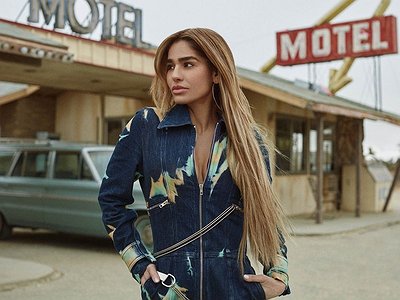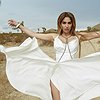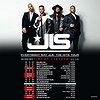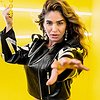Part 1
Name: Shabnam Kamoii aka Shab
Nationality: American-Irani
Occupation: Singer, songwriter
Current release: Shab's new single “VooDoo” featuring Fat Joe is out now.
Recommendations: As far as artists are concerned, I would steer people towards two artists.
First of all, the abstractionist Vassily Kandinsky, whose use of colour and shapes has influenced so much of today’s modern art and design. When you view his use of scribblings & tonal washes, it becomes easier to trace his influence through successors like Jean-Michel Basquiat, Jackson Pollock or Mark Rothko. It is claimed that Kandinsky literally saw colours when he heard music, which assessment is easier to visualize after reviewing his artistic output.
And secondly, the British sculptress Emily Young, whose monolithic works in stone bring to mind the course of human history and man’s transformation of nature. Our family had a part in bringing one of her seminal works to the University of Notre Dame as well as a piece that marks the foyer of my home. Truly thought-provocative stuff.
But I’d like to bring a third artist to light, the Dallas-raised artist Jimmy Sasso, now working on Los Angeles. He’s done a wide range of more commercial art over the years – tellingly, his website is called www.artogo.com – but some of the more complex paintings that he has done in recent years really catch one’s eye. It is no mystwry that the artworks in my home which raise the most interest from visitors are pieces that Jimmy much gave us.
If you enjoyed this Shab interview and would like to keep up to date with her music, visit her official homepage. She is also on Instagram, Facebook, and twitter.
When I listen to music, I see shapes, objects and colours. What happens in your body when you're listening? Do you listen with your eyes open or closed?
That actually depends! If the song is a slammer, I will listen to the tune sometimes with my eyes open to simply enjoy the beats: but less frequently, I will close my eyes as to better envisage the structure of the arrangement.
On the other hand, with songs that might be considered more lyrically-driven, I will often close my eyes so as to better interpret the words. As those tunes tend to be slower songs, it also helps me to enjoy the beauty of the orchestration.
What were your very first steps in music like and how would you rate the gains made through experience - can one train/learn being an artist?
Wow, I was just exploring that subject with someone close to me during the last few days!
It's amazing to me that I only started pursuing this business on a full-time basis during the last three years, with most of my discography only published during the last 18 months and with my first tour less than a year ago. I was incredibly lucky to link up with my producer and collaborator, Damon Sharpe, who was extremely patient with me as I was learning about this business.
In regard to my own circumstance, I have found that, with experience, comes confidence. I am surprised as to how much I have learned over the last two years, particularly after being on stage with increasing frequency and with increasingly larger audiences. And now I am about to launch my first arena tour in support of JLS, which I expect will be yet another increment of learning. 
But my own situation aptly demonstrates that artists may be born, but they can also be trained!
According to scientific studies, we make our deepest and most incisive musical experiences between the ages of 13-16. What did music mean to you at that age and what’s changed since then?
Music is always been a foundational component of my life. It was a glue that helped bond and comfort my family during my childhood years in Iran.
But you have picked a funny age range for this question, those years are bisected by my arrival in the United States at the age of 14. During that timeframe, I transitioned from the music that I was hearing during 1990s Germany and to the vast range of influences that were dominating the radio stations on the East Coast of the United States.
So when you consider that I grew up throughout my formative years listening to music in Iran, Germany and America, it shouldn't be any surprise that I have been exposed for a wide range of music ... which goes a long way towards explaining my sound.
So music has gone from being an important part of my life to one of its very foundations. Today I live and breathe music and spend the vast majority of my time (when I am not being a Mom) working on this musical journey!
Where does the impulse to create something come from for you? What role do often-quoted sources of inspiration like dreams, other forms of art, personal relationships, politics etc play?
Like probably every other musician, I am listening to other artists towards discerning where The Sound is headed these days. I forget the name of the 19th century French politician who essentially said, “Show me where the people are going so that I can lead them there.” [It was Alexandre Auguste Ledru-Rollin - 15Q]
As to my own original ideas, that type of inspiration springs up from every facet of your life. Your family and friends always cause creative thoughts to percolate, right? And there is so much unfolding in the world these days, at seemingly an accelerating rate, that if you can't find inspiration in the events of the times, then you're probably not observing very well.
But I'm pretty sure that it was Picasso who said that good artists copy but great artists steal. And if that's the case, I am probably still more copying at present but definitely getting ready for thievery.
How would you describe your own relationship with your instrument, tools or equipment – is it an extension of your self/body, a partner and companion, a creative catalyst, a challenge to be overcome, something else entirely?
My voice is my voice is my voice. What you hear is probably 95% of who I truly am.
And while I am always trying to improve both as an artist and as a person, I hope that it is obvious that I am pretty happy with where I am today.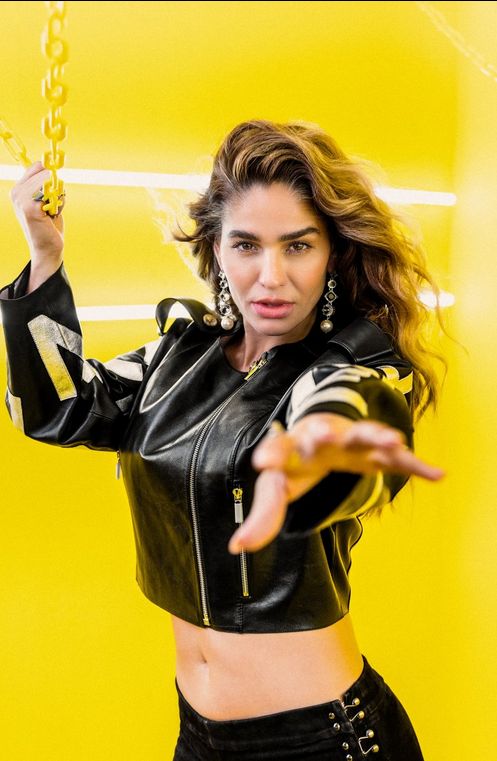
Shab Interview Image (c) the artist
Are you acting out certain roles or parts of your personality in your music which you couldn't or wouldn't in your daily life? If so, which are these? If not, what, would you say, are the key ideas behind your approach to music?
I guess I kind of jumped into your next question from that answer!
My family and my friends would attest that I am very much a loving person and a People Person. I can be that chatty individual that you hope never sits next to you on an airplane when you are tired. I love meeting people and always want to give off good energy.
So yeah – what you hear in my music or read in my interviews is almost identical to my private voice. And the differences between my Public Self and my Private Self tend to be subject matter only suitable for adults.
Music is a language, but like any language, it can lead to misunderstandings. In which way has your own work – or the work of artists you like or admire - been misunderstood? How do you deal with this?
My songs are relatively straightforward, so in most cases there isn’t room for misinterpretation. But I admittedly do have moments when I find myself asking what exactly did I intend by this lyric?
But for the most part, I think that it’d be great if people were interested enough such as to misinterpret my songs. If art is in the eye of the beholder, their perspective and interpretation of my songs should be more important than my own.
Making music, in the beginning, is often playful and about discovery. How do you retain a sense of playfulness as things become more professionalised and how do you still draw surprises from equipment, instruments, approaches and formats you may be very familiar with?
It may surprise you that -- to a point -- I find that the whimsy of my own creative process tends to increase, and often proportionally, with the application of technology and structure.
While the process for creating music has become a little bit of an increasingly computerized, one can do an infinite number of things compositionally that could have never occurred just 15 years ago. It frees you to implement in real time the instant musings of your mind, but with a level of complexity that was unimaginable prior generations. Moreover, a lot of the fun in creating music in 2023 arises from the bending and breaking some of the structure that you reference.
So while I know that many bemoan the demise of musicianship per se, my sense is that such sensibilities probably underline the sentiment of The Haters when Dylan went electric at Newport. So before I was alive, much less making music, it was undeniable and inevitable that the times change: and music should and will inevitably change with the times.




